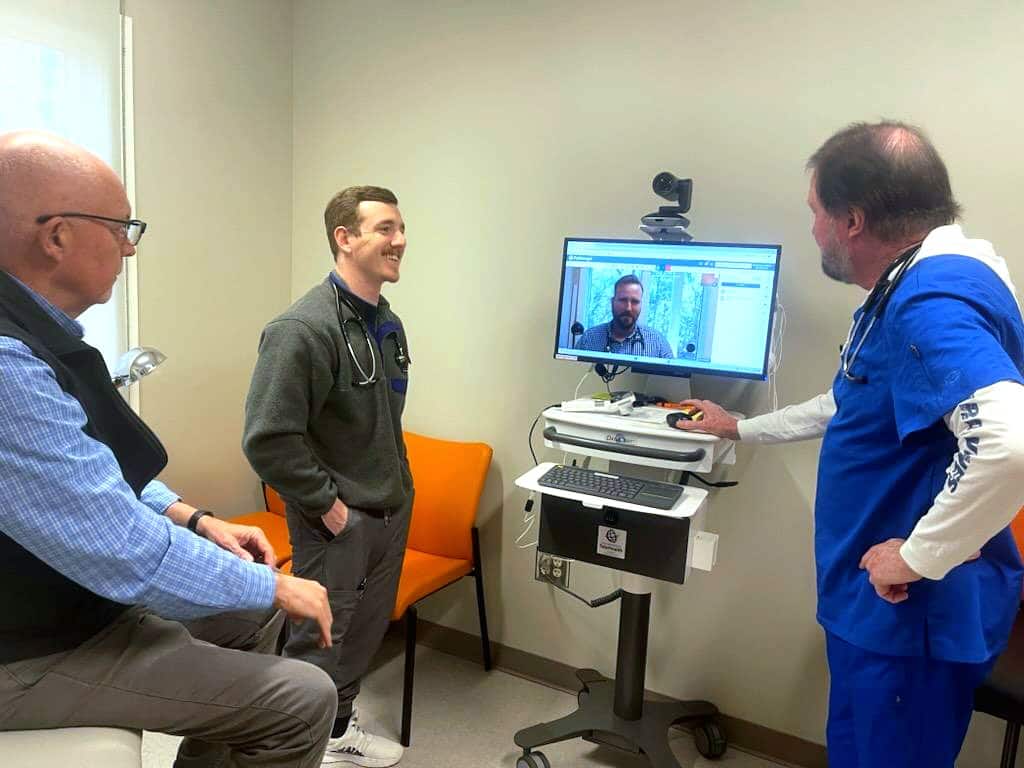
The Georgia Rural Health Innovation Center sponsored the installation of telehealth equipment at Mercer Medicine Harris County in Hamilton, Georgia, as part of a pilot project to expand health care access in rural communities. Telehealth not only gives an opportunity for people to reach a primary care provider, but it also increases access to subspecialists without the patient having to travel away from their home county.
David Kay, MD, is a primary care practitioner at Mercer Medicine Harris County. Recently, one of his patients was experiencing psychiatric issues. Through a telehealth appointment at Dr. Kay’s office, the patient was connected with Jacob Hanna, MD, of Mercer Medicine Macon. “I knew Dr. Hanna had the skills to connect with and win over this patient.”
Telehealth is more than just a phone call. It allows patients to see the physician on the other end and build trust and confidence. Roman Fortin, a first-year Mercer University School of Medicine (MUSM) student on the Columbus campus, said, “One of the benefits of doing telehealth in this way, especially for mental health, is the psychiatrist and the patient were able to get that non-verbal communication, which they would not be able to get over a phone call.”
Telehealth visits through a high quality, secure system is more effective than virtual consultations through other means. Dr. Kay said that by doing the visit in the office, the patient and physician were in a safety bubble, and they were able to gain the greatest possible benefit out of the one-hour interview.
When patients already have an established rapport with the primary care physician in the office — Dr. Kay in this case — it only adds to the strength of the care team. Dr. Kay enters the room with the patient to make the formal introductions. He can also perform physical exams, as necessary, with peripheral equipment on the telehealth cart, which allows the physician on the other end to visualize and review results in real time.
After the patient completed the telehealth visit with Dr. Hanna, Dr. Kay was there to immediately follow up and evaluate the patient before leaving the office, further strengthening the doctor-patient relationship and the patient’s confidence. Cody Waterman, also a first-year MUSM student in Columbus, said, “Dr. Kay was invested in good care for him. He was invested in making sure the patient liked his session with Dr. Hanna.”
Dr. Kay views telehealth appointments as a win-win situation. In this situation, an in-person appointment could have been made, but the patient would not likely have driven to Macon for that appointment, especially given his condition.
Dr. Kay recognizes that telehealth may not be a substitute for face-to-face care in every situation, but it is nonetheless a viable access point for health care when appropriate. “There is something in between no care and face-to-face specialty care,” he said. That is telehealth.
Waterman expressed hope in that more and more patients will opt to use telehealth in their health care. “As time goes on and more people start utilizing this resource and word of mouth starts, we might see a lot more people that might not otherwise would have sought care.”
Pictured: Ed Honeycutt, senior telehealth project manager, leads a telehealth simulation with first-year Mercer University School of Medicine students Cody Waterman and Roman Fortin (on screen) and Dr. David Kay, of Mercer Medicine Harris County (far right).
